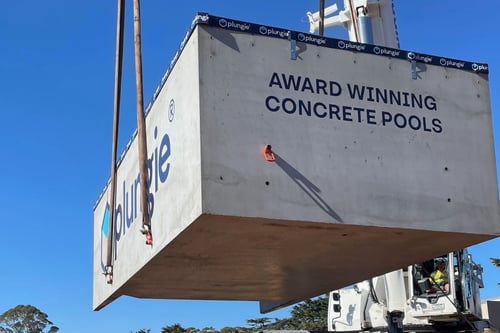When it comes to creating your dream pool, the water inside it matters just as much as the shape, finish and tiles. While chlorine has long been the go-to for pool sanitation, magnesium mineral pools have grown in popularity, especially among homeowners looking for a gentler, more wellness-focused experience.
There’s a growing interest among Australians in pool systems that offer both health benefits and environmental advantages. It’s no surprise, then, that more homeowners are weighing up the pros and cons of chlorine and magnesium options.
So how do the two compare? Whether you’re planning your backyard build or simply refining your vision, here’s what you need to know before making the plunge.

What’s the Difference?
Both chlorine and magnesium swimming pools rely on chlorine to sanitise your pool, the key difference lies in how the chlorine is introduced.
Traditional chlorine pools are treated manually with chlorine tablets or liquid. It’s a direct approach and one many pool owners are familiar with. Magnesium pools, on the other hand, use a blend of minerals (usually magnesium chloride, potassium chloride and sodium chloride), which are then converted into chlorine via a chlorinator.
If you’re considering switching to magnesium, the good news is that many existing pools can be converted with relative ease. The process involves testing your pool water, balancing the chemicals and adding the right mineral blend. With help from pool maintenance experts or inline systems, the transition can be smooth and easy.
While magnesium pools still have chlorine, it’s created differently and often feels gentler in the water. In both cases, the result is a safe and sanitised swim. But the experience in the water, and after you step out, can feel quite different.
Fortunately, pool designs like Plungie’s precast concrete range are compatible with both systems, so you can enjoy the benefits of a concrete pool, while choosing the water type that suits your lifestyle.

Magnesium Pools: A Gentler Way to Swim
Why are so many people making the switch? Well, magnesium mineral pools have gained attention for more than just their clean aesthetic. They’re a favourite for people looking for a softer, more luxurious swim.
Unlike traditional systems, magnesium pools are known to feel smoother on the skin, with many users reporting a noticeable difference in both the water’s texture and how their skin feels after just one dip. The magnesium blend can also help soothe sore muscles and support skin hydration, making it ideal for swimmers with sensitive skin, eczema or psoriasis.

What Makes Magnesium Pools so Good for You?
Magnesium is an essential mineral that supports healthy muscles, nerves and skin, which is why swimming in a magnesium pool can offer gentle, soothing benefits that go beyond just clean water.
- Skin-friendly – magnesium is gentle on skin and eyes, even for babies and children
- Gentler on hair – magnesium pools help prevent dryness and damage, keeping your hair softer and more manageable after every swim.
- Wellness perks – magnesium is believed to aid muscle recovery and promote relaxation.
- Soft, silky water – many swimmers describe it as a “resort-like” experience.
What’s more, magnesium is fully compatible with all Plungie pools, with no major upgrades needed. So, if you already have a Plungie pool, you’re good to go. It works seamlessly with most standard saltwater chlorinators and, being non-corrosive, it’s gentle on your pool equipment and surrounding finishes too.

Chlorine Pools: The Traditional, Trusted Option
There’s a reason chlorine pools are still a backyard staple. Reliable, accessible and time-tested, chlorine delivers powerful sanitation that keeps your water crystal clear, even with heavy use.
For families who want something familiar and easy to maintain, chlorine offers a no-fuss solution. With well-established dosing methods and compatible pool chlorinators available through Plungie, it’s a system that works, without reinventing the wheel.

Why Choose Chlorine? Maintenance, Costs and Familiarity
Before you decide, it’s important to weigh the maintenance needs, potential drawbacks and cost implications of owning a magnesium pool compared to chlorine. Here’s why chlorine remains a popular choice for many:
- Proven performance – trusted by public pools, resorts and homeowners alike.
- Lower upfront and ongoing costs – chlorine products are more budget-friendly.
- Easy to source – available at Bunnings, IGA or your local pool supply store.
- Familiar maintenance routines – most pool owners are already used to managing chlorine.
But it’s worth keeping in mind that chlorine pools:
- May dry out skin and hair
- Can cause stinging eyes
- May be accompanied by a strong chlorine smell
So, Which One’s Better?
There’s no one-size-fits-all answer, both magnesium and chlorine pools are effective at keeping your water safe and clean. If you’re looking for a cost-effective, tried-and-true solution, a traditional chlorine pool might suit your needs perfectly. But if comfort, wellness and skin sensitivity are top priorities, magnesium mineral pools are well and truly worth the upgrade.
Still weighing up your options? Check out the differences between saltwater and mineral pools to get a full picture of what’s possible.
Whatever you choose, Plungie is here to make wellness feel effortless. With our range of precast concrete pools, you’ll have the flexibility to choose a water treatment system that works best for you, whether that’s mineral-rich luxury or simple, reliable chlorine.

Your Pool, Your Water, Your Way
Whether you prefer the feel of magnesium minerals or the simplicity of traditional chlorine, one thing’s certain: your pool deserves a smarter foundation. With Plungie’s award-winning precast concrete design, you don’t have to compromise on quality, comfort or style.
Contact our friendly team today and take the first step toward a pool that fits your lifestyle, inside and out.


.jpg?width=325&height=163&length=500&name=House%202%20Han%20and%20Can%20-%20project%20gallery%20(4).jpg)
